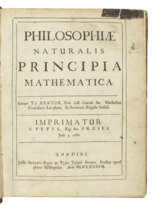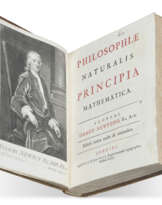ID 870730
Лот 148 | NEWTON, Sir Isaac (1642-1727)
Оценочная стоимость
£ 250 000 – 350 000
Philosophiae naturalis principia mathematica. Edited by Edmond Halley (1656-1743). London: Joseph Streater for the Royal Society [at the expense of Edmond Halley], to be sold by various booksellers, 1687.
First edition of ‘the greatest work in the history of science’ (PMM), described by its former owner, the Franco-German mathematician Philippe Naudé the younger (1684-1745), as ‘the climax of human intelligence’. The long inscription in Latin on the verso of the title indicates this copy was in the possession of one Philippe Naudé, most probably Philippe Naudé the younger (1684-1745), a correspondent of Newton. In 1723, Naudé sent a laudatory letter to Newton (Newton Correspondence, VII, 1405, Cambridge: 1959-1977) discussing his recent reading of the Principia. Although this copy possesses the title-page with the two-line imprint, indicating one scheduled for distribution in Britain, Naudé’s letter implies that his copy of the Principia was either sent to him or bought on the continent, ‘because my unhappy fate has never permitted me to visit your island.’ In this letter, he tells Newton, having tackled the works of Keill, ‘sGravesande, Mariotte and Gregory on his way to understanding Kepler’s Third Law of Planetary Motion, ‘then truly I burned with an impotent desire to understand the demonstration of this theorem at least and that drove me at last, most illustrious Sir, to attempt to read that incomparable work, which I have justly called the climax of human intelligence and which has tormented and exercised the most skilful geometers and astronomers of our age for thirty years, I mean your book of the Principia, which book I had indeed not yet dared to tackle.’
The letter continues in a similar vein, denigrating Leibniz and Bernoulli in favour of Newton, expressing that ‘I have never in my whole life seen anything for which I have felt more deeply grateful, than for these things that I have understood [from you, Newton].’ Naudé’s praise for Newton borders on religious fervour: ‘I now behold your face, incomparable Sir, in a painted likeness, which I keep close by me day and night, and because I glimpse and contemplate your mind and spirit too in your works, continually turned over by my fingers’. Naudé states that that he possesses an almost complete collection of Newton’s works, excepting: ‘only one of your works … is lacking to me … Analysis per Quantitatum Series 1711’, and asks whether it is still for sale in London. It is believed Naudé died leaving an unpublished manuscript commentary on Newton's Principia, but this is probably now lost.
Philippe Naudé the younger followed his father, Philippe Naudé the elder, in lecturing in mathematics at the Joachimsthalsches Gymnasium in Berlin. Later, he was appointed professor at the French College of Berlin, becoming a member of the Berlin Academy of Sciences in 1711, and then later a Fellow of the Royal Society in London in 1738.
The printing history of the Principia is well documented, and two issues are distinguished, based on the two states of the title-page: one with a 2-line imprint, as here, and one with a 3-line imprint naming the bookseller Samuel Smith, each reflecting domestic versus foreign distribution. The present copy belongs to the issue for distribution in Britain (two-line imprint), traditionally designated the first. The edition was divided between two compositors working concurrently, one setting the first two books, the other setting the third. W. Todd has identified a number of stop-press corrections, but they cannot be related to either issue.
Described by Einstein as ‘perhaps the greatest intellectual stride that it has ever been granted to any man to make’, the Principia elucidates the universal physical laws of gravitation and motion which lie behind phenomena described by Newton's predecessors Copernicus, Galileo and Kepler. Newton establishes the mathematical basis for the motion of bodies in unresisting space (the law of inertia); the motion of fluids and the effect of friction on bodies moving through fluids; and, most importantly, sets forth the law of universal gravitation and its unifying role in the cosmos. ‘For the first time a single mathematical law could explain the motion of objects on earth as well as the phenomena of the heavens. … It was this grand conception that produced a general revolution in human thought, equalled perhaps only by that following Darwin's Origin of Species’ (PMM). Newton’s scientific views were not seriously challenged until Einstein's theory of relativity and Planck's quantum theory, and his principles and methods remain essential for the solution of many scientific questions.
Babson 10; Dibner 11; Grolier/Horblit 78 (‘the most influential scientific publication of the seventeenth century’); PMM 161; A.N.L. Munby, ‘The two title-pages of Newton's Principia’ in Notes and Records of the Royal Society 10 (1952); W. Todd's bibliography in Koyré & Cohen's ed. of Newton's Principia II, 851-3; Norman 1586 (3-line imprint title); PMM 161; Wallis 6; Wing N-1048.
Quarto (245 x 186mm). Folding engraving of cometary orbit bound at p.1, numerous woodcut diagrams. Title in first state with 2-line imprint, uncancelled; P4 cancel correcting orientation of the diagram on verso, errata at end (without final blank Ooo4 as usual, title stained in upper portion from old paper pasted over inscription on verso of title, repair to closed tear in margin of C2 just touching a letter, occasional spotting and staining, slightly heavier towards end). Late 18th-/early 19th-century German half sheep (rubbed, spine worn and missing its label, headcap defective). Provenance: Philippe Naudé the younger (1684-1745; long ownership inscription on verso of title in Latin, this covered by old paper) – over 40 marginal pencil notes in a neat Roman hand referring to the corrections in the errata (some trimmed by the binder) – ?S. Breder (ink inscription on front free paper dated ‘Berlin 1828' – Gisela Wehner? (20th-century ownership inscription on front free endpaper).
Special notice
No VAT on hammer price or buyer's premium.
| Автор: | Исаак Ньютон (1643 - 1727) |
|---|---|
| Место происхождения: | Северная Европа, Европа, Великобритания |
| Категория аукционного дома: | Печатные книги |
| Автор: | Исаак Ньютон (1643 - 1727) |
|---|---|
| Место происхождения: | Северная Европа, Европа, Великобритания |
| Категория аукционного дома: | Печатные книги |
| Адрес торгов |
CHRISTIE'S 8 King Street, St. James's SW1Y 6QT London Великобритания | |
|---|---|---|
| Предосмотр |
| |
| Телефон | +44 (0)20 7839 9060 | |
| Комиссия | see on Website | |
| Условия использования | Условия использования |
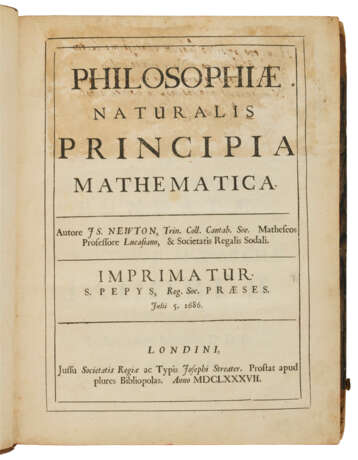
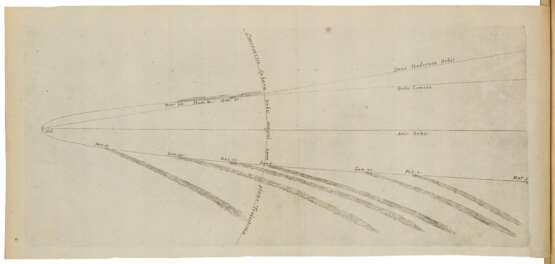
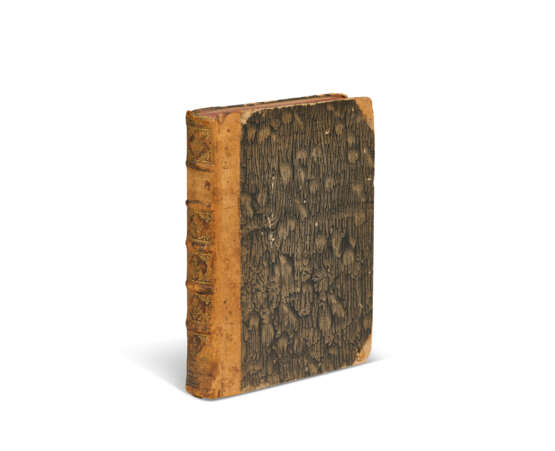

![[NEWTON, Isaac (1642-1727)]](/assets/image/picture_4036009/5c8e6/3e601c7a9444e346ef4136ceaf96156f1720562400jpg__fix_162_205.jpeg)

